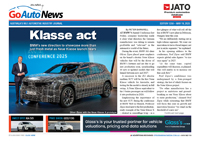News - General News - ScrappageBrits scrap over scrappageBring out your dead: Hyundai UK was quick off the mark to promote its i10 after the announcement of Britain's scrappage scheme. British cash-for-scrap vehicle scheme receives mixed reaction from UK motor industry23 Apr 2009 AN OFFICIAL vehicle scrappage scheme revealed as part of yesterday’s UK government budget has been met with wildly opposing views from within the British automotive industry. Announced by national finance minister, chancellor of the exchequer Alistair Darling, in his annual budget statement to parliament, Britain’s cash-for-scrap vehicle policy follows the successful introduction of similar schemes in France, Italy and Germany. The program will see owners of cars more than 10 years old offered £2000 ($A4100) to trade up to new (and in theory, more fuel-efficient) vehicles in an effort to both stimulate new-vehicle sales and reduce overall CO2 emissions. Around 10 million cars in the UK are reported to be 10 or more years old. As previously reported, the potential for a similar vehicle recycling scheme in Australia is known to have been canvassed among members of the Federal Chamber of Automotive Industries (FCAI), which represents all new-vehicle brands locally. Instead, the FCAI has since backed the federal government’s 30 per cent business vehicle tax allowance until June 30. A vehicle scrappage scheme has the backing of the Motor Traders’ Association of NSW and some imported vehicle brands in Australia, but has received luke-warm support from local car-makers and was dismissed by federal industry minister Kim Carr on the basis of cost. While new passenger car sales in Australia were down 18.1 per cent in both March and during the first quarter of 2009, last month they increased by 40 per cent in Germany, 8.1 per cent in France and 0.24 per cent in Italy - the nation's first monthly rise in a year. Car sales in the UK, where motor industry groups have called for subsidies including a scrappage scheme since November 2008, were down by 29.7 per cent in the first three months of 2009. The British recycling plan could apply pressure on legislators in both Australia and the US, where first-quarter light vehicle sales declined by 38.4 per cent. According to Automotive News in the US, bills introduced in the House and Senate still face significant obstacles, including whether new cars to be bought must be made in North America or can be manufactured overseas. Under the official UK scheme, which is due to commence in mid-May and concludes in March 2010 (unless the fund is exhausted earlier), the one-off payment will be made up of £1000 from the government and £1000 from the relevant car-maker, whose participation in the program will be voluntary. Eligible vehicles must have been first registered in the UK before August 1999, and have been owned for more than 12 months by a registered keeper with a current UK address. The subsidy applies only to purchasers of new cars or commercial vans up to 3.5 tonnes. BMW, Ford, Toyota, Volvo, Renault and Nissan, which announced a £2000 minimum trade-in against any British-built Nissan for cars between eight and 10 years old, have joined Citroen and Hyundai in signalling their intention to sign up for the program. However, other brands are holding off their decision until all details of the plan have been revealed next week by the UK department for business, enterprise and regulatory reform (BERR) secretary Peter Mandelson. Mr Mandelson is due to meet the UK’s equivalent of Australia’s FCAI, the Society for Motor Manufacturers and Traders (SMMT), next week to discuss the finer details of the scheme. But the SMMT has already flagged its desire for more “flexibility” in the scheme, and it is believed the major objection from many vehicle brands is the program’s requirement that any manufacturer that signs up must offer the £2000 discount across its entire model range. It’s understood many brands will object to offering discounts on small cars, prices of which traditionally include smaller profit margins than larger and more expensive vehicles. “This is good news for consumers and will get people back into showrooms, kick-starting demand in the market,” said SMMT chief executive Paul Everitt. “The scheme recognises the economic value of the motor industry and we are determined to make it a success. There is clearly a great deal to do and we look forward to discussing the finer detail of the proposal with government in the coming days.”  While Citroen UK established a scrappage-based discount offer before the scheme was announced in this week’s budget, which also includes a new £250 million ($A514 million) program to encourage the sale of electric cars (EV) from 2011, Ford’s support is significant given it is Britain’s top-selling vehicle brand. While Citroen UK established a scrappage-based discount offer before the scheme was announced in this week’s budget, which also includes a new £250 million ($A514 million) program to encourage the sale of electric cars (EV) from 2011, Ford’s support is significant given it is Britain’s top-selling vehicle brand.In a campaign dubbed ‘Scrappage Plus’, Ford will offer further discounts across its large car range on top of the £2000 – ranging from £1250 ($A2568) for a Ford Fusion, £2500 ($A5137) for a Mondeo and £3000 ($A6167) for a Galaxy. Toyota has said it will take part in the scheme, but has not announced additional discounts, while Volvo will pay a deposit contribution for anyone hire-purchasing low-emission C30 Drive, S40 Drive and V50 Sportswagon Drive models. Kia Motors UK welcomed the budget’s scrappage measure, but said it did not go far enough. “Kia welcomes the Government’s positive response to the difficult times facing the new car market, but I am personally disappointed that our chancellor is only going half-way compared to other European governments,” said Kia UK managing director Paul Philpott. “I am pleased for consumers and for our dealers that the chancellor has taken positive action and that he is introducing this scheme rapidly. The devil will be in the detail and I am sure the SMMT will be looking for early meetings with the treasury to discuss this. “The reality is that the government is shifting a large part of the cost of this programme on to the shoulders of the manufacturers, when it is the manufacturers who are working hard night and day to deal with the effects of the economic turmoil and recession around the world,” he said. However, the official UK scheme was immediately welcomed by the Retail Motor Industry Federation (RMIF), which represents car dealers and service centres. “The introduction of a vehicle scrappage scheme as announced in the budget will boost the new car market, encourage consumers to get back into car showrooms, and reduce the likelihood of (job cuts) in this sector,” said RMIF chairman Paul Williams. “A number of other EU member states have boosted vehicle sales through scrappage schemes. A similar scheme has seen great success in Germany, where new car sales saw a 40 per cent monthly rise and attracted over half a million buyers. “By opting for a vehicle scrappage scheme, the government has taken the opportunity to boost the new car market, while simultaneously helping consumers buy a new car. “The nation's car dealer network, which will be in the front line for the duration of the scheme, has the expertise that will enable the scheme to be a success and will assist government in the implementation of the scheme,” he said. Some estimates say the scheme could boost sales in the UK by up to 300,000 vehicles in its 10 months of operation, but automotive industry analyst JD Power said it will add about 100,000 sales, making it less successful than the German subsidy. “There are two key differences between the German situation and that in Britain,” said JD Power Automotive Forecasting’s Arthur Maher. “One is that this British scheme – unlike that in Germany – will only be half financed by government, leaving the dealer or manufacturer to find the £1000 balance. It’s not quite clear what that will mean exactly, but at the bottom end of the market in particular where margins are slim, it could cause difficulties. “Secondly, the German scheme was backed up by big discounts on prices provided by the manufacturers. In the UK, the Pound-Euro exchange rate leaves little room for similar activity and indeed, some manufacturers have even tried to increase prices on exchange rate difficulties. “We were forecasting 1.6 million new car sales in Britain this year and that has been revised upwards to 1.7 million units,” Mr Maher told Just-auto. Some 2.4 million vehicles were sold in the UK in 2007, when a record 1,049,982 new vehicles were sold in Australia. “Next year is complicated by the ending of the scheme. There may well be a rush in the first quarter ahead of its demise with the annualised running rate possibly getting as high as 1.8 million units, but there would be a 'payback effect' from those brought forward sales in following quarters,” he said. Meantime, industry vehicle valuation publication Glass’s Guide has predicted the UK scheme is unlikely to have a significant impact on the residual values of used cars of any age. “The majority of consumers already interested in purchasing a nearly-new car will not be existing owners of cars 10 years or older, and will therefore not be eligible for the scrappage bonus,” said managing editor Adrian Rushmore. “For this reason demand will not switch from late-plate to new vehicles, harming late-plate values. “Most of the vehicle manufacturers’ share of the £2000 scrappage bonus is already on offer to potential car buyers in the form of sales discounts and incentives. The manufacturers’ scrappage bonus will largely replace these incentives, not supplement them, and today’s used car values already take full account of current low transaction prices on new cars. “The scrappage scheme is likely to increase demand for new city cars and superminis (light cars) more than any other type of car. Many of these cars are already in limited supply, and the expected additional demand will merely serve to extend delivery lead times. Customers not eligible for the scheme will also find themselves joining lengthening queues, and are therefore more likely to consider a late-used alternative. “In addition, manufacturers may also seize the opportunity to increase list prices on those models in the highest demand. These factors will conspire to support – or possibly even promote – prices for the nearly-new small and lower-medium car.” While the UK motor industry has given its tentative approval for the scrappage scheme, British green groups say it will not encourage the sale of more environmentally-friendly vehicles. “Without setting a limit on the CO2 emissions of the new cars bought under this scheme, it makes a mockery out of the government’s said commitment to developing this country as a leader in green motoring,” said Thegreencarwebsite.co.uk editor Faye Sunderland. “The scrappage incentive is now meaningless as it will not necessarily encourage the sale of greener cars. It is senseless to introduce the scheme in such a way.” UK motorists’ representative group, the RAC Foundation, said it remains to be seen if the scrappage incentive would promote the purchase of more fuel-efficient vehicles in the UK. “Currently, the vast majority of cars are still on the road at 10 years old,” said the RAC’s professor Stephen Glaister. “Indeed at 14 years old, half are still on the road. The scrappage scheme announced today risks consigning a lot of perfectly good, and relatively clean, vehicles to the dustbin. “However if the scrappage scheme leads to a reduction in the average age of the national car fleet then this has to be good for road safety as more modern cars will have a wider range of safety features built-in. “And whilst the announcement is good for motorists and the motor industry, if it does not encourage people to buy green vehicles, it is a missed opportunity as far as the environment is concerned.” Read more:Green UK body slams scrappageScrappage blow-out costs Germany Private car tax incentives urged Dealers continue scrappage push British EV initiative Suzuki calls for green incentives MTAA proposes scrappage scheme |
Click to shareGeneral News articlesResearch General News Motor industry news |














Facebook Twitter Instagram